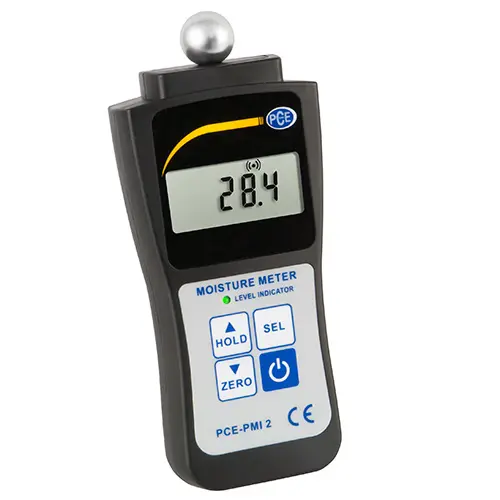The Science Behind Moisture Meters: How They Work and Why They're Important
The Science Behind Moisture Meters: How They Work and Why They're Important
Blog Article
The Ultimate Overview to Moisture Meters: A Comprehensive Introduction and How They Can Save You Cash
In the world of structure upkeep, building and construction, and various sectors, the importance of accurately measuring dampness levels can not be overstated. Wetness meters function as crucial devices in detecting and keeping an eye on moisture content in products, aiding in protecting against costly damages and guaranteeing the quality of items. Understanding the nuances of different types of dampness meters, their applications, and the possible cost-saving benefits they provide can be a game-changer for professionals and businesses alike. Discovering just how these tools can not just simplify processes yet also add to financial savings is a trip worth beginning on.
Sorts Of Moisture Meters
Numerous kinds of dampness meters are offered for various applications in numerous markets. One typical kind is the pin-type moisture meter, which determines the electrical resistance in between 2 pins placed into a material. This kind is suitable for wood, drywall, and other structure materials. Pinless dampness meters, on the various other hand, use electromagnetic sensor plates to check a larger location without causing damages to the product's surface. These meters are ideal for promptly assessing moisture degrees in large locations such as walls and floorings.
Infrared wetness meters determine the thermal residential properties of a product to identify its moisture web content non-invasively, making them beneficial for applications where pin or pinless meters may not be ideal. Recognizing the various kinds of wetness meters available can aid sectors select the most proper device for their certain dampness dimension needs.

Advantages of Using Moisture Meters

Moreover, making use of moisture meters can lead to raised power effectiveness. In farming setups, wetness meters play a critical function in enhancing crop returns by allowing farmers to keep track of dirt wetness levels and make informed watering choices.
How to Pick the Right Moisture Meter
Choosing the proper moisture meter involves taking into consideration essential variables such as material compatibility, measurement variety, and calibration accuracy. When selecting a moisture meter, it's vital to make sure that the meter is suitable for the details product you will certainly be testing. Different materials have varying electrical residential or commercial properties that can affect dampness analyses, so choosing a meter made for your material is important for accurate results. Furthermore, consider the measurement range of the moisture meter. Ensure that the meter can spot wetness degrees within the array required for your applications. Calibration precision is an additional critical variable to bear in mind (Moisture Meter). Go with a dampness meter with trustworthy calibration to make sure constant and precise analyses. Some meters might call for regular calibration modifications, so understanding the calibration procedure is essential. By thoroughly reviewing these variables, you can pick a moisture meter that fulfills your requirements and offers exact wetness dimensions for your jobs.
Proper Strategies for Moisture Meter Use
To make certain precise dampness analyses and maximize this hyperlink the effectiveness of a wetness meter, employing correct methods is vital. When making use of a pin-type dampness meter, insert the pins or probes right into the material being checked up until they make complete contact. By adhering to these correct techniques, customers can rely on their wetness meter to supply reliable moisture degrees, aiding in avoiding costly damage or ensuring high quality in various applications.

Price Financial Savings Through Moisture Meter Applications
Just how can the critical utilization of moisture meters lead to considerable price savings across numerous sectors? Wetness meters play a crucial function in price financial savings by stopping possible damages and making certain high quality control in different fields. In the farming market, dampness meters help in establishing the optimal time for harvesting plants, protecting against excess or over-drying wetness that can affect the final product's high quality. This accurate monitoring assists farmers prevent unneeded losses and optimize their return.

Furthermore, in the food processing sector, moisture meters are important for checking product quality and making certain conformity with safety and security regulations. By internet precisely gauging moisture material in food products, suppliers can protect against wasting, keep quality, and minimize waste, causing substantial cost savings. In general, the tactical application of dampness meters is a useful investment that can result in substantial expense reductions and enhanced effectiveness across various industries.
Conclusion
In verdict, dampness meters are beneficial devices for identifying and determining dampness levels in various products. By making use of the best dampness meter and adhering to appropriate strategies, users can efficiently stop expensive problems created by excess wetness.
Dampness meters serve as vital tools in detecting and keeping an eye on moisture content in materials, helping in protecting against costly problems and guaranteeing the quality of products. Infrared moisture meters determine find more information the thermal properties of a material to determine its moisture web content non-invasively, making them valuable for applications where pin or pinless meters may not be ideal.Moisture meters use important advantages in properly assessing and monitoring dampness levels in diverse products and atmospheres. In farming setups, dampness meters play an important duty in enhancing crop yields by making it possible for farmers to keep an eye on dirt moisture levels and make educated irrigation choices.In final thought, wetness meters are important tools for measuring and discovering moisture levels in various products.
Report this page